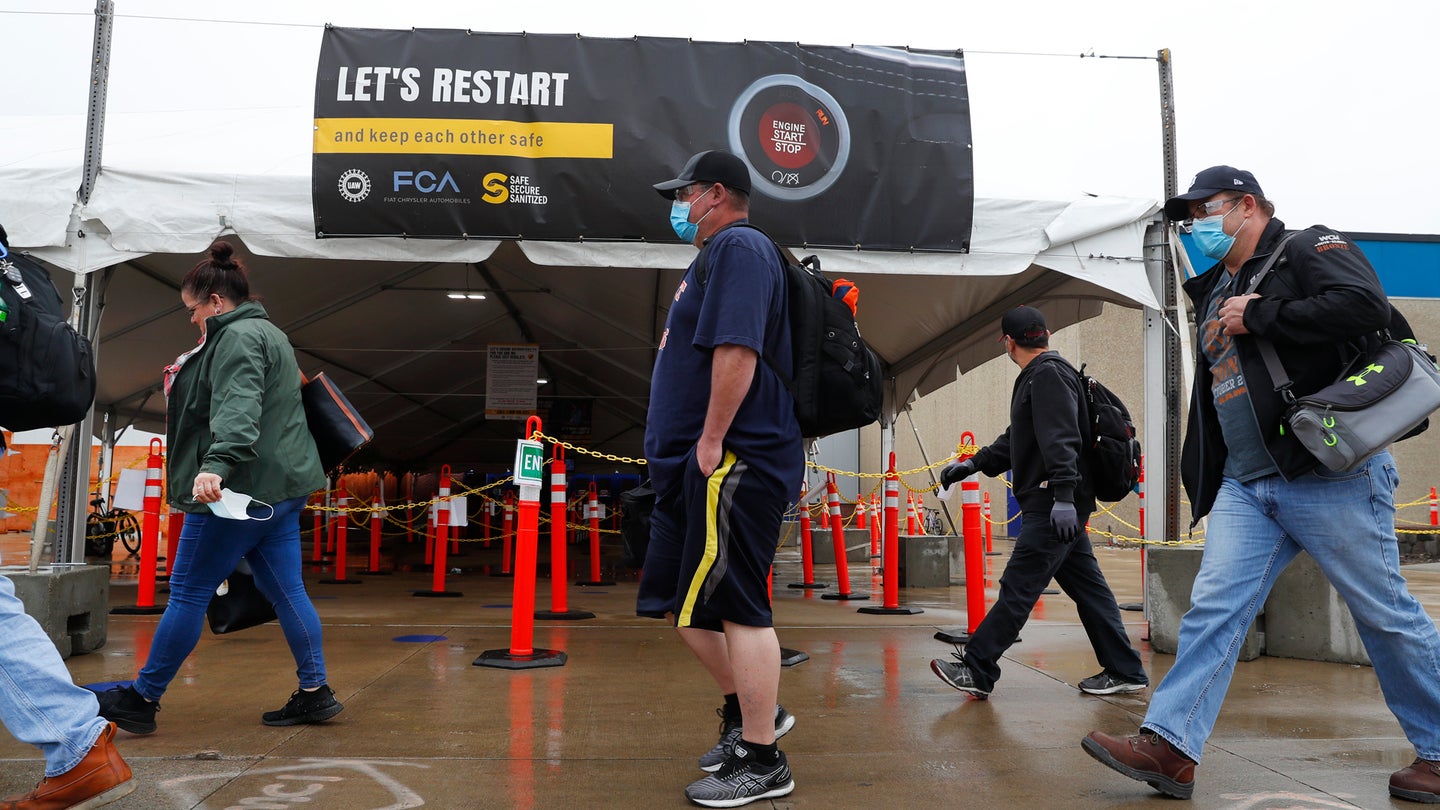Michigan’s Governor Warns Auto Plants Could Shut Down If Public Doesn’t Wear Masks
“A second wave of this virus could be absolutely devastating.”

Good morning and welcome back to Speed Lines, The Drive's roundup of what matters in the world of cars and transportation. It's Thursday, which is good, because that means it's almost Friday. On today's docket: Michigan's governor warns auto plants could shut down if people don't wear masks, more on General Motors' electric vehicle strategy during the pandemic and Nissan is trimming its output for the rest of the year.
"Absolutely Devastating"
American auto factories restarted earlier this summer after a months-long pause over the coronavirus, and though they did so with aggressive new safety measures, they've had plenty of struggles. Parts shortages, supply chain disruptions, virus outbreaks and absenteeism have all been persistent issues, all as America's dealers see their remaining car and truck supplies dwindle. Even if conditions are extremely safe within the plants, automakers can't control their workers' behavior off the lines—or that of the people they come into contact with.
As such, Michigan Gov. Gretchen Whitmer yesterday issued a stern warning to the people of her state: if you don't wear masks, and Michigan sees a resurgence of the virus, auto factories may have to shut down again. From Bloomberg:
“If Michiganders don’t mask up when we go out in public, cases could rise and we could be forced to close down more of our businesses, including auto manufacturing plants that employ thousands,” Whitmer said at a press conference in Lansing, Michigan. “A second wave of this virus could be absolutely devastating.”
The warning comes as automakers are cranking up output at factories to try to meet surprisingly strong demand, especially for pickups and sport-utility vehicles. General Motors Co., Ford Motor Co. and Fiat Chrysler Automobiles NV temporarily shuttered their factories in Michigan and elsewhere in the U.S. in March to help control the Covid-19 outbreak.
As that story notes, coronavirus cases are ticking up again in Michigan, with nearly 900 new cases being reported yesterday—the most since mid-May.
Needless to say, a second shutdown would be a crushing blow to the auto industry. Ford, GM and Fiat Chrysler are all desperate for new vehicles—trucks in particular—to hit dealer lots. New vehicle sales have been abysmal in many parts of the country but truck sales have managed to be one of the few bright spots. And this is an industry on which countless people in Michigan, and globally, depend on for their livelihoods.
At the same time, state officials there and automakers have to balance keeping the lights on with keeping people safe, and that's clearly no small task. The answer? Wear a mask in public and keep your distance from other people for a while. It's not hard.
GM "On Track" For Big Electric Spend
As with the rest of the global auto industry, the pandemic has arrived at an especially rough time for GM. It's seeking to aggressively pivot to electric vehicles in the years and decades to come, with the eventual goal of becoming fossil-fuel free. Now it has to navigate that along with declining sales, slumping profits and uncertainty around production.
Nevertheless, the automaker is pushing forward with its big EV investments, it reaffirmed in a sustainability report released today. GM says it's undeterred by the pandemic, as far as shifting to electricity goes. Here's what it says it's up to:
- Allocate more than $20 billion of capital and engineering resources to its electric and autonomous vehicle programs between 2020 and 2025.
- Continue site preparation at GM and LG Chem’s joint venture cell manufacturing plant, Ultium Cells LLC, in Lordstown, Ohio.
- Deliver EVs that will allow GM to compete for nearly every customer, from those seeking a high-performance machine to a full-size truck. The Ultium battery enables a breadth of vehicles to be built across brands and segments on the same platform. Upcoming products include the Cadillac LYRIQ, which will go into production in 2022; the GMC HUMMER EV, which will go into production in late 2021; and the Cruise Origin.
So while it's doubling-down on truck sales for now, GM isn't punting the electric future down the road just because of the pandemic. So far that seems to be true of the industry as a whole. We'll see if that commitment will last.
Nissan, However, On Track To Make Big Cuts
If the new Nissan Ariya is any indication, I doubt the embattled Japanese automaker is eyeing big cuts to electrification either. But it is cutting global vehicle production through the end of the year as it scrambles to slash costs and turn its problems around, reports Reuters:
Nissan is planning for production to increase from 510,000 vehicles in the first quarter to around 930,000 in July-September, the sources said. Second quarter output will be about 25% lower from a year ago, according to Reuters calculations.
Production is expected to increase to around 1.1 million vehicles in October-December, roughly 8% lower on the year.
In July-September, Nissan’s output will be hit hardest at home, falling around 47% from last year, after the automaker said it would cut more shifts at its Japanese assembly plants. Domestic output will recover slightly through December.
I'm eager to see what this means for dealers and car buyers in America, as both have struggled with supply issues in recent months.
On Our Radar
Toyota tweaks sedans for 2021 after dropping Yaris (Automotive News)
Read These To Seem Smart And Interesting
Your Turn
Do you foresee a second shutdown for some of America's auto factories?
